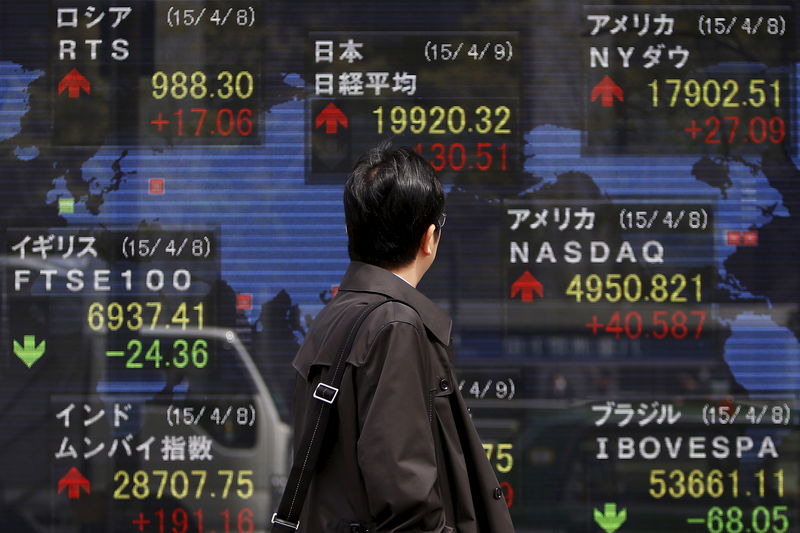TSX jumps amid Fed rate cut hopes, ongoing U.S. government shutdown
* Graphic: World FX rates in 2020 http://tmsnrt.rs/2egbfVh
* Coronavirus death toll in China rises to 361
* China c.bank injects $174 bln of liquidity on Monday
* Economists lower growth forecasts for Chinese economy
* European shares rise on Brexit relief
By Ritvik Carvalho
LONDON, Feb 3 (Reuters) - World shares sank to their lowest
in seven weeks on Monday, dragged down by a plunge in Asian
stocks on their first trading day after a long break on fears
the coronavirus epidemic would hit demand in China.
Aiming to head off any panic, the Chinese government took
steps to shore up an economy hit by travel curbs and business
shut-downs because of the virus. Despite the support, Chinese shares were deep in the red,
with the blue-chip index .CSI300 stumbling 7.8% to a 4-1/2
month trough. The benchmark Shanghai Composite index .SSEC
lost $420 billion of its value while the yuan opened at its
weakest level in 2020, sliding past the symbolic 7-per-dollar
level CNY= . MSCI's All Country World Index .MIWD00000PUS , which tracks
shares in 47 countries, was down 0.2% on the day, and at its
lowest since Dec. 16.
European shares bucked the broader trend however, opening a
tad higher as investors were relieved that the UK had finally
exited the EU, although ongoing fears over the virus dampened
enthusiasm.
The pan-European STOXX 600 index was 0.2% higher in early
deals in London. Blue-chip British stocks .FTSE added 0.4%.
While China's losses were heavy, they were mostly a product
of selling pressure that had built up over the Lunar New Year
break, not a reflection of new market fears. In contrast,
futures for U.S. and European shares inched up, oil pared early
losses while safe havens Japanese yen JPY= and gold XAU=
stepped back from recent highs.
"The market seems to have reacted quite reasonably," said
Pala Asset Management portfolio manager David Nietlispach.
"There is no panic and no selloff of securities that are
unrelated to the coronavirus. The government interventions have
been so heavy though that you will see an impact on the global
economy."
E-Mini futures for the S&P500 ESc1 jumped 0.6% during
European hours on Monday pointing to a positive start for Wall
Street after a rout last week.
Yet, Asian markets, more broadly, remained in a sell-off
mode with MSCI's broadest index of Asia-Pacific shares outside
Japan .MIAPJ0000PUS down for an eighth straight day to be off
0.9% at 527.39 points, its lowest since early December.
Japan's Nikkei .N225 dived 1% to the lowest since November
and Australia's benchmark index .AXJO ended 1.3% lower.
"The impact in Chinese equity markets have been in line with
what futures were suggesting so the market has taken the slump
in its stride," said Rodrigo Catril, Sydney-based strategist at
National Australia Bank. "There was also some cushion from the
new measures."
A total of 361 people have died in China from the
coronavirus, with the first death outside the mainland reported
on Sunday in the Philippines. SLOWDOWN
In a bid to soften the blow on China's economy, the
country's central bank cut reverse repo rates by 10 basis points
and injected 1.2 trillion yuan ($173.8 billion) of liquidity
into the markets on Monday. Beijing also said it would help firms that produce vital
goods resume work as soon as possible, state broadcaster CCTV
reported. Still, a raft of global economists, including Citigroup,
Nomura and JPMorgan, downgraded their forecasts for China's GDP
growth. "By extension, this will likely have an impact on global
growth, too, given China's large contribution to global growth,"
Nomura said.
That means equity markets, especially in Asia, will likely
remain under pressure as the number of infections is expected to
increase in the weeks ahead.
"Until the rate of new cases peaks, equities are in limbo –
too late to sell, too early to buy," said Sean Darby, Hong
Kong-based strategist at Jefferies.
As Chinese markets opened after the 10-day break, Shanghai
copper SCFcv1 hit its daily selling limit as did Shanghai
crude oil ISCcv1 while yields on the country's 30-year
government bonds traded in the interbank market were down 18.5
basis points. Dalian soymeal DSMcv1 plunged 4.1% while Dalian iron ore
DCIOcv1 hit limit down with steel prices tumbling too.
In currencies, the safe-haven Japanese yen JPY= eased a
tad but was still near a 3-1/2-week high against the dollar at
108.61. The euro EUR= was 0.2% lower at $1.1067 and the pound
GBP= slipped 0.6% to $1.3122.
That left the dollar index, which measures the greenback
against a basket of major currencies, a shade higher at 97.479.
Gold XAU= , which posted its best month in five in January,
slipped 1% to $1,574.5 an ounce, while yields on U.S. debt came
off lows. US2YT=RR
Oil futures too pared early losses after skidding sharply
earlier in the session on concerns the coronavirus outbreak
would hit China's oil demand.
Brent crude LCOc1 was last down 0.6% at $56.27 a barrel
after falling more than $1 at one stage. U.S. crude CLc1 fell
0.1% to $51.51.
